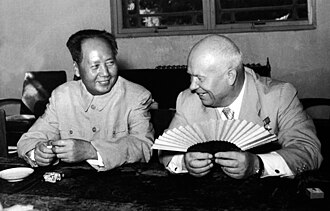Sino-Soviet split
The Sino-Soviet split (1956-1966) was a time when the relations between the People's Republic of China and the Soviet Union weakened during the Cold War. Eventually, China's leader, Mao Zedong, decided to break the alliance with the Soviet Union.
The Soviet leader, Stalin, wanted to help spread communism in the world, including China. In the Second Sino-Japanese War, the Soviets gave weapons and supplies to the Kuomintang (KMT), and advised the Communists to ally with them against the Japanese Empire. The Chinese Civil War continued, however. After World War II, Stalin and the Soviet Union helped the Communists. Chinese leaders disliked the Soviet leaders for not helping Mao and the Communists from the start.
The Split
Suddenly, in 1953, Stalin died. Mao saw Stalin as the leader of Communism, but also had a bad relationship with the Soviet Union throughout his time as leader. The new Soviet leader, Nikita Khrushchev, was not like Stalin. He did not want capitalism to collapse like Stalin did. Mao got angry about this, and he wanted Nikita Khrushchev to help him fight the imperialists. Khrushchev said no, and then Mao decided that if Khrushchev was not going to cooperate, they would not work with each other anymore.
Later, there was peace between the USSR and China, but they were suspicious of each other. They were no longer allies, and Mao's supporters said that it had been a victory.
Sino-Soviet Split Media
China* Soviet Union* Countries that shared borders with both: Mongolia was Soviet-aligned while Afghanistan and North Korea remained neutral, with the former eventually becoming Soviet-aligned in the late 1970s.
Chairman Mao with US journalist Anna Louise Strong, whose work presented and explained the Chinese Communist revolution to the Western world. (1967)
A meeting of some Sino-Soviet leaders in 1958. From left to right: Ye Jianying, Peng Dehuai, Nikolai Bulganin, and Nikita Khrushchev.
Solidarity: China's Mao Zedong and Albania's Enver Hoxha were united in both their stance against Revisionism as well as ideologically upholding Stalin.
A public appearance of Chairman Mao and Vice Chairman Lin Biao among Red Guards, in Beijing, during the Cultural Revolution (November 1966)








